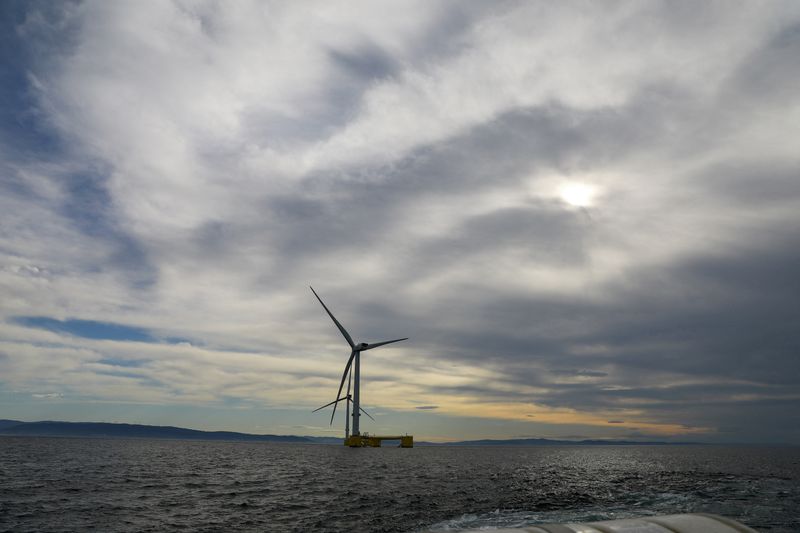By Nina Chestney and Susanna Twidale
LONDON (Reuters) - Britain's latest subsidy auction for new renewable energy projects failed to attract bidders from the offshore wind industry, raising fears among developers and environmental groups that the country may struggle to meet its climate goals.
Over the last two decades, the industry has grown fast, lowered technology costs to be on a par or even cheaper than fossil fuels in some parts of the world and increased efficiency through bigger and bigger turbines.
Here are some of the reasons the industry is beginning to struggle:
SUPPLY CHAIN DISRUPTIONS
The COVID-19 pandemic from 2020 led to lockdowns, decreased industrial activity and reduced global energy demand.
In the wind power sector, as in other industries, restrictions on movement triggered supply chain disruption and delays in project construction.
Limits on the number of workers allowed on site and delays in components from China and elsewhere meant that some wind developers had to delay or even cancel projects.
Some firms also missed policy deadlines that meant that they lost out on government support or subsidies for which they previously qualified, the International Energy Agency said. The war in Ukraine has also created logistics and supply chain issues, aggravated in some cases by the impact of sanctions.
RISING PROJECT COSTS
Despite mounting pressure to combat climate change by moving to renewable sources, financing projects has been a challenge.
The war in Ukraine last year led to higher energy prices and this fuelled rises in inflation and interest rates.
But the expected revenues of those planning to build wind turbines have not risen in tandem. Many governments index the prices paid for wind energy, usually through auctions, which are often too low, analysts at Wood Mackenzie said.
Overall project costs have risen around 40% over the past few years, developer Vattenfall said when halting its British Norfolk Boreas offshore wind farm in July, due to inflation, higher commodity costs and high costs of capital.
COMPETITION
As more governments have announced ambitious climate targets, pressure on companies to increase renewables development has increased.
Established wind manufacturers, already competing with each other to drive down component and technology costs and increase wind farms' efficiency with huge turbines, also face new entrants.
Traditional wind project developers, such as utilities, increasingly face competition from oil and gas majors seeking to diversify their portfolios, who have often outbid them in wind tenders and auctions.
Some oil and gas companies, however, are also struggling with poor returns from renewables while oil and gas profits have hit record levels in response to high energy prices.
COMPONENTS
Most of the problems of Siemens Energy's wind unit Siemens Gamesa concern its onshore turbine fleet, where the group has discovered quality issues in certain components, including rotor blades and bearings.
Among the issues which arise from operating wind turbines, wear and tear on turbine blades over time can lead to erosion.
The increasing size of blades on turbines also raises the risk of lightning strikes and repairs.
For offshore wind, harsh weather conditions can also result in corrosion of foundations or of the turbine.
Leading wind turbine maker Vestas flagged quality issues with turbine blades in its onshore fleet in 2020 and provided an extra 600 million euros to fix them.
($1 = 0.9170 euros)
